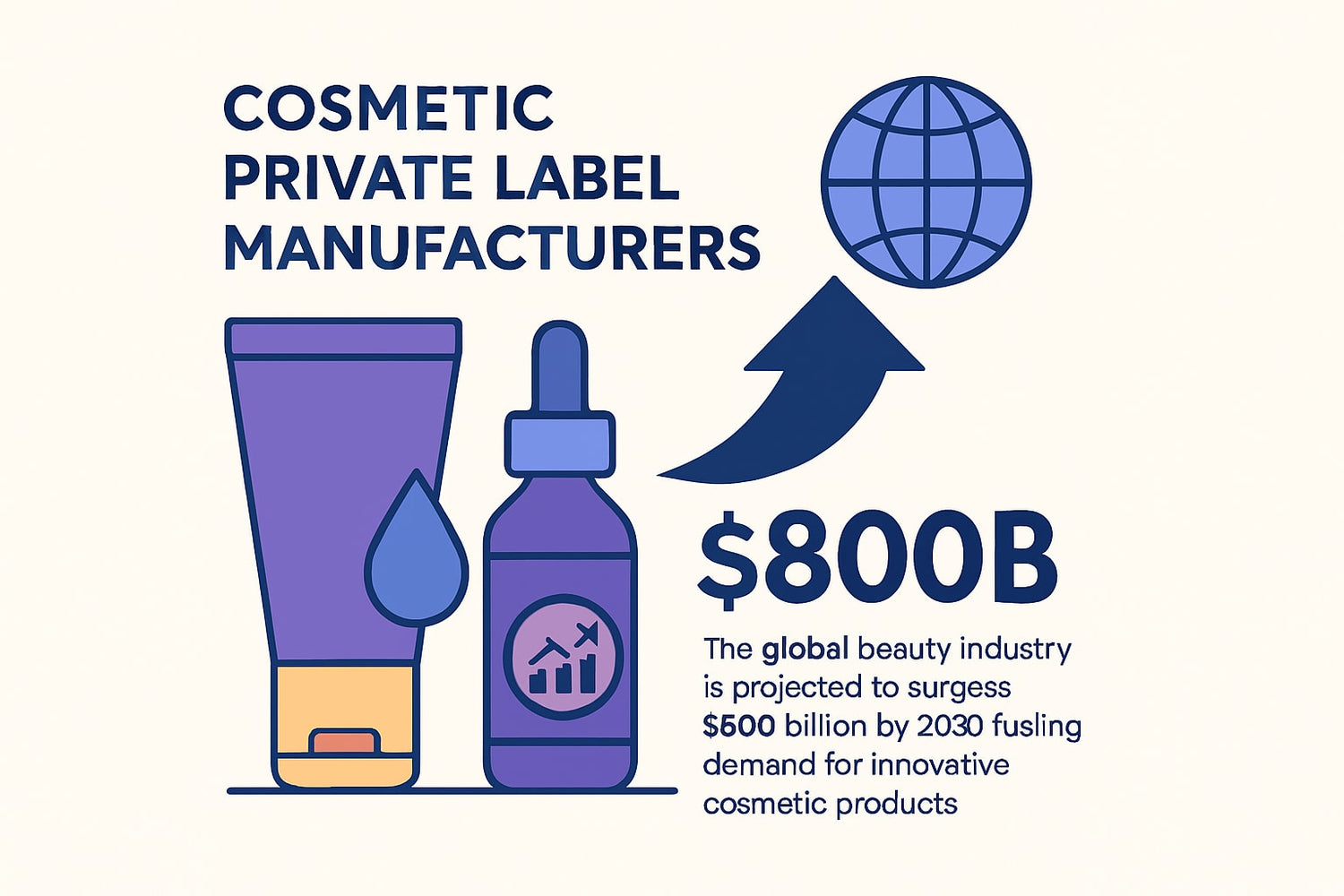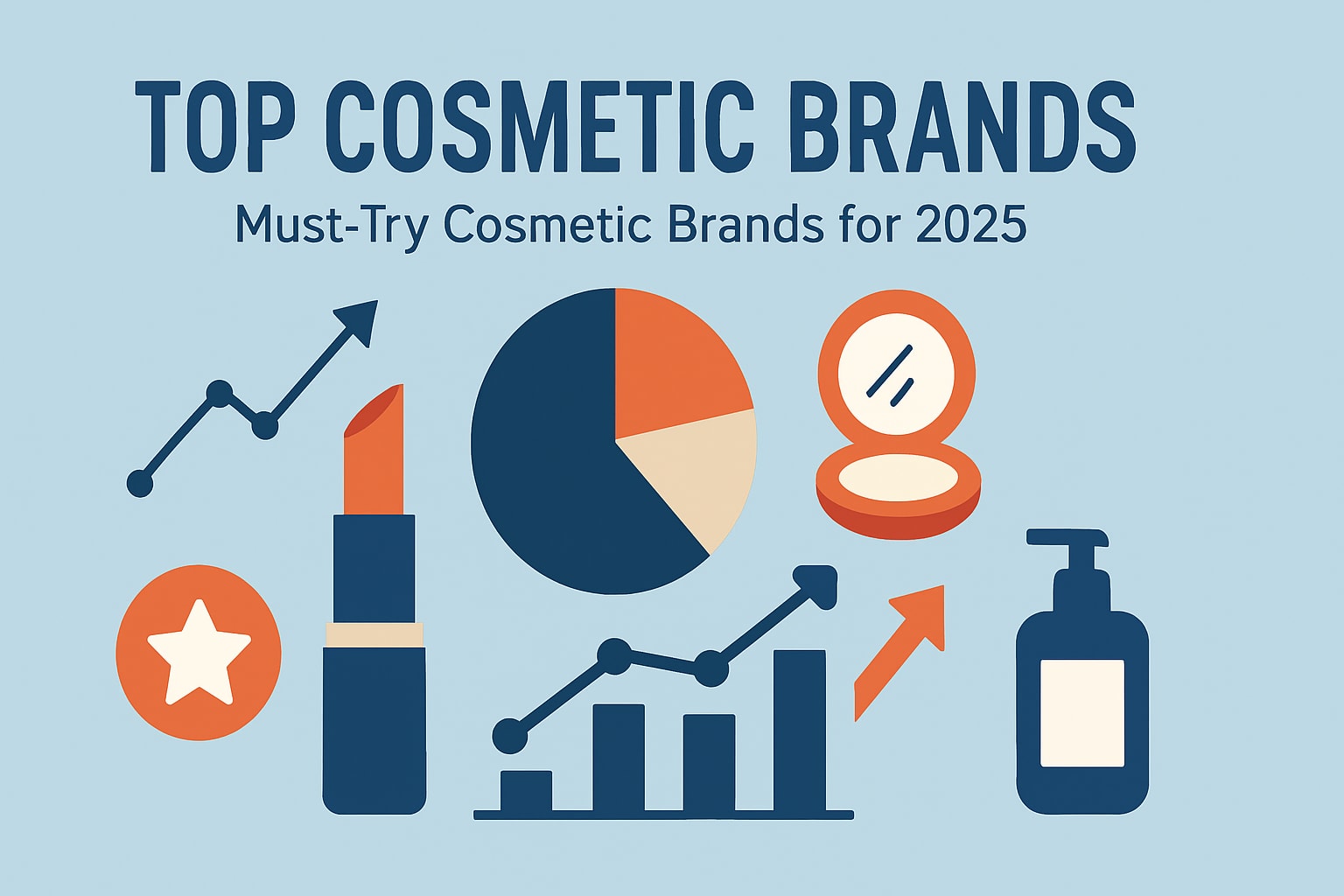The global beauty industry is booming, with projections exceeding $800 billion by 2025. As competition intensifies, selecting the right cosmetic private label manufacturers becomes essential for brands aiming to differentiate themselves. This guide spotlights nine leading cosmetic private label manufacturers poised to shape the industry in 2025. Discover each manufacturer’s unique strengths, pricing, features, and target audience to make informed decisions for your brand’s future success.
The Rise of Private Label Cosmetics in 2025
The landscape of beauty is rapidly evolving, and cosmetic private label manufacturers are at the heart of this transformation. As the industry grows, brands and entrepreneurs are embracing private label solutions to keep pace with changing consumer demands, new trends, and the constant push for innovation.
Market Growth and Trends
Cosmetic private label manufacturers are experiencing unprecedented growth as demand for unique, clean, and ethical beauty products intensifies. The surge is fueled by consumers seeking vegan, cruelty-free, and transparent formulations. Indie beauty brands are leveraging private labeling to launch quickly and compete with established names.
Social media and influencer marketing amplify this movement, allowing even small startups to reach global audiences. According to Statista, private label cosmetics are projected to account for 30% of total beauty sales by 2025. Major retailers, such as Target and Sephora, have launched in-house lines, further validating the trend. For a deeper dive into this industry revolution, explore the rise of private label skincare.
Key Factors Driving Manufacturer Selection
Selecting the right cosmetic private label manufacturers involves careful evaluation of several key factors. Formulation quality and ingredient transparency are top priorities, ensuring products meet consumer expectations and regulatory standards. Minimum order quantities (MOQs) and scalability determine whether a manufacturer can support both small launches and future growth.
Brands also weigh speed-to-market and customization capabilities, as rapid product development is essential in a fast-moving industry. Compliance with FDA, GMP, and ISO certifications adds credibility and safety. Startups, in particular, seek manufacturers offering agile, small-batch production to minimize risk and maximize flexibility.
Challenges in the Private Label Industry
Cosmetic private label manufacturers face complex challenges as they scale to meet global demand. Navigating supply chain disruptions often leads to delays and fluctuating costs, especially when sourcing raw materials internationally. Maintaining consistency and quality across large production runs is another hurdle.
Balancing cost efficiency with premium product standards requires ongoing optimization. Intellectual property and white labeling concerns can arise, particularly for brands sharing similar formulations. For example, some companies have experienced production delays due to shortages in key ingredients, impacting their ability to launch on schedule.
Essential Criteria for Choosing a Manufacturer
When evaluating cosmetic private label manufacturers, brands should prioritize proven track records and a robust client portfolio. The range of product categories, such as skincare, makeup, and haircare, signals versatility and expertise. Support services like design, packaging, and branding offer added value throughout the product lifecycle.
Sustainability initiatives, including eco-friendly packaging and responsible sourcing, are increasingly vital. According to Nielsen, 60% of beauty consumers now prefer sustainable products, making this a competitive differentiator. Certifications and transparent practices further build trust and long-term brand equity.
How to Evaluate and Compare Private Label Manufacturers
Choosing the right cosmetic private label manufacturers is a pivotal step for any beauty brand aiming for long-term growth. With a saturated market and evolving consumer demands, a thoughtful evaluation process can be the difference between a thriving product line and a costly misstep. Here is how to systematically compare cosmetic private label manufacturers to ensure the best fit for your business objectives.
Assessing Capabilities and Expertise
Begin by evaluating the technical strengths of cosmetic private label manufacturers. Look for evidence of robust formulation capabilities, in-house research and development, and advanced manufacturing technology. A manufacturer with expertise in your product category—whether skincare, makeup, or haircare—can significantly streamline your launch.
Check for dedicated labs, skilled chemists, and regulatory specialists. Brands seeking unique or innovative products should prioritize partners with custom formulation experience. For deeper insights, consider reviewing the power of custom cosmetic formulations. This approach ensures your line stands out in a crowded field.
Understanding Pricing Models and MOQs
Transparent pricing is essential when comparing cosmetic private label manufacturers. Request detailed quotes that break down per-unit costs, setup fees, and available volume discounts. Evaluate minimum order quantities (MOQs) for both stock and custom products, as this can impact your initial investment and scalability.
Be vigilant about hidden fees for packaging, compliance, or shipping. Use a comparison table to organize and assess costs across different manufacturers. Remember, 40% of brands cite MOQs as a primary selection criterion, so align your choice with your business stage and budget.
Evaluating Customer Service and Support
Exceptional customer service is a hallmark of reliable cosmetic private label manufacturers. Assess the responsiveness of account managers and the availability of comprehensive support, from design to branding and marketing assistance.
Startups should seek partners with dedicated onboarding and flexible guidance, while established brands may need more robust logistics and scaling support. As your brand grows—say, from 100 to 10,000 units per order—the quality of support can directly impact timelines and brand reputation. For a complete checklist, refer to this guide to choosing a skincare manufacturer.
Checking Certifications and Compliance
Certifications are non-negotiable when selecting cosmetic private label manufacturers. Confirm that your chosen partner holds relevant credentials, such as GMP, ISO, and FDA registrations. These certifications signal adherence to industry standards and regulatory requirements.
Additionally, verify compliance with cruelty-free, vegan, and organic certifications if these align with your brand values. Intellectual property protection should also be a priority, especially for innovative formulations. According to Mintel, 70% of consumers trust certified beauty products, making this a crucial aspect of your evaluation process.
Future Trends Shaping Cosmetic Private Label Manufacturing
As the beauty sector evolves, cosmetic private label manufacturers are redefining industry standards. The next wave of trends will reshape product development, operations, and brand strategies. Let us explore the four pivotal areas that will define the future landscape.
Sustainability and Clean Beauty
Sustainability is at the forefront for cosmetic private label manufacturers in 2025. Brands are demanding eco-friendly materials, recyclable packaging, and clean formulations. Many manufacturers are responding by adopting biodegradable solutions and reducing their environmental footprint.
A growing number of brands now incorporate upcycled ingredients, which helps reduce waste and appeals to eco-conscious consumers. Manufacturers are also offering certifications to verify cruelty-free and vegan claims, meeting the expectations of a marketplace where 60% of buyers prefer sustainable products.
These changes are not just trends, they are becoming industry norms. For cosmetic private label manufacturers, adapting to these demands is essential to remain competitive.
Technology and Innovation
Technological advancements are accelerating progress for cosmetic private label manufacturers. AI-driven formulation tools are enabling rapid product development and trend analysis. Manufacturers use automation to streamline production and ensure stringent quality control measures.
Blockchain technology is gaining traction for ingredient traceability, providing transparency from source to shelf. This innovation reassures consumers about product safety and authenticity. As discussed in the Private Label Cosmetics Market 2026: A Deep Dive into Market Trends and Growth Projections 2033, investment in technology is fueling new product launches and smarter manufacturing decisions.
Manufacturers that embrace these tools can deliver higher quality, customized solutions, and faster speed to market.
Customization and Personalization
Personalization is redefining how cosmetic private label manufacturers engage with brands. Demand for bespoke products is soaring, with consumers seeking formulations tailored to their skin type, tone, and lifestyle.
Manufacturers are responding by offering flexible, small-batch runs and digital tools for custom product configuration. Some now provide personalized skincare kits based on user skin analysis or online quizzes.
This shift empowers brands to deliver unique offerings and strengthen customer loyalty. For cosmetic private label manufacturers, investing in personalization capabilities is a key differentiator in a crowded market.
Globalization and Market Expansion
The global reach of cosmetic private label manufacturers is expanding rapidly. Companies are entering emerging markets, especially in Asia-Pacific and Latin America, to capitalize on rising beauty consumption.
Manufacturers are adapting product lines to meet regional regulations, ingredient preferences, and cultural trends. According to the Private Label Cosmetics Market Size | Industry Report, 2030, Asia-Pacific is expected to represent 35% of global beauty sales by 2025.
This globalization trend is prompting manufacturers to enhance logistics, diversify product offerings, and build strategic partnerships worldwide.
As you explore the opportunities and challenges in today’s private label cosmetics landscape, it’s clear that choosing the right partner is key to building a brand that stands out—especially when sustainability, customization, and innovation matter most. If you’re ready to turn your vision into reality and want expert guidance from concept through production, let’s take the next step together. You don’t have to navigate this journey alone; I invite you to Start Your Product Journey and discover how your unique ideas can become award-winning products in a fast-evolving market.


